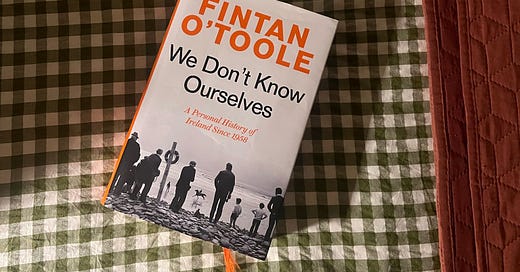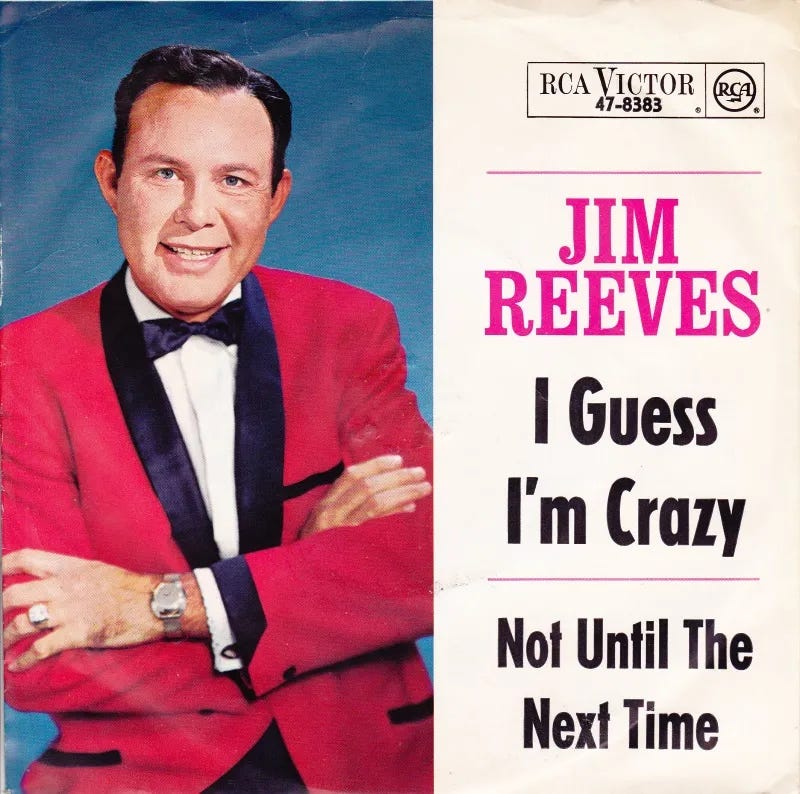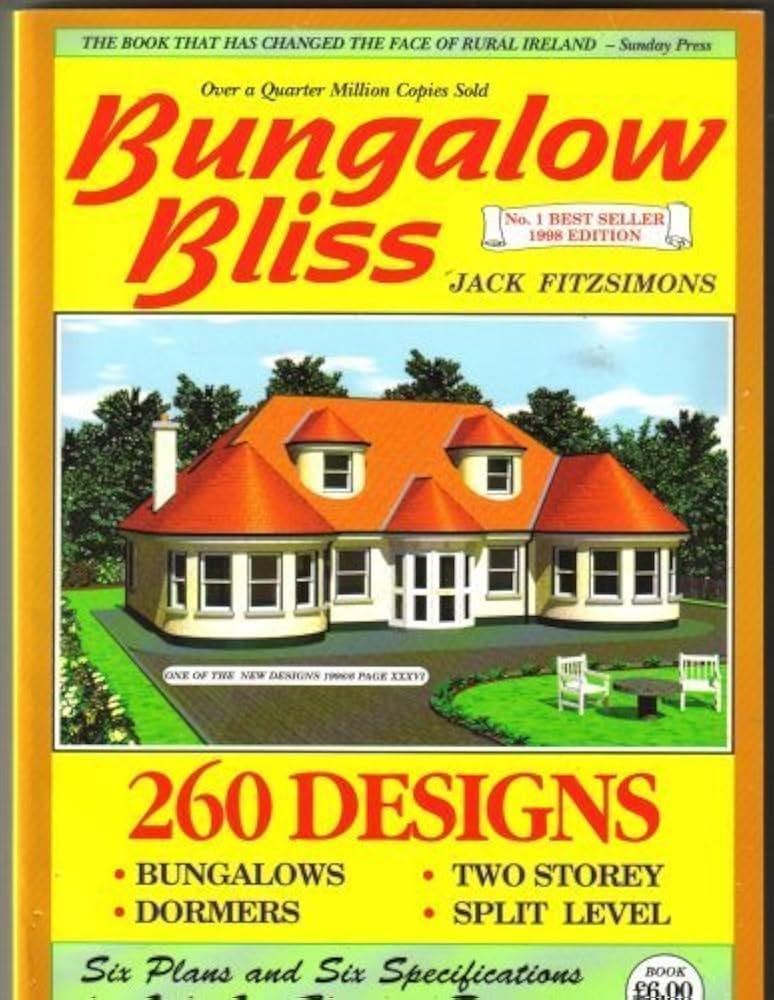Why Irish people love country and western music
And 19 other things I learned from Fintan O'Toole
Well hello there. How’s it going?
Me: well, I had a couple of Very Important Meetings about my book coming up, and it turned out I was in denial about how heavily the anticipation was weighing on me.
I know, shocker. You think you’re *soooo* evolved and then you realise you’re just as basic and terrified of failure as everyone else. Urgh.
So of course, I fell back on what my unevolved self always falls back on, i.e. over-preparing for The Thing. “I can’t possibly have these conversations unless I consume 600 pages of Irish history RIGHT THIS INSTANT!” my inner voice screamed.
And so I picked up Fintan O’Toole’s We Don’t Know Ourselves, which I bought in hardback in 2021, then plonked on a shelf and proceeded to ignore for four years. Occasionally, I’d side-eye its bold-lettered orange spine and feel guilty about having not read it already. But not guilty enough to pick it up. It was just so BIG and INTIMIDATING for someone who writes a lot about Irishness but didn’t actually study any Irish history at school.
Plus, it looks like a book a man might read and Have Opinions about, whereas I tend to read books by women and Have Feelings about them.
macho macho memoir, I gotta be a macho memoir
I might have approached it like I was revising for my Chemistry GCSE but, believe me, this was far more pleasurable. O’Toole is meticulous and funny, with an outsider’s eye for the absurd. The route he takes from 1958 to the present day is perfect for an easily intimidated non-historian like me, moving from seminal political moments to rural Ireland’s love of bungalows and country and western music.
Reader, I devoured it.
So, without further ado, here are 20 Things I Found Fascinating from F O’T and his non-memoir memoir.
Descaminados. In 1958, Ireland was so economically underdeveloped that it was put into a special category of countries looking to join the European Free Trade Association (EFTA) along with Greece, Turkey and Iceland - and Iceland, at least, had fish. How mortifying, how galling, especially considering Ireland had been independent for about 35 years at the time. What was the point in not being British if you’re still horribly poor? “We are with the descaminados [shirtless ones] of Europe!” James Dillon, former Irish Minister of Agriculture, wailed.
Doubleness. O’Toole talks a lot about the “doubleness” of Irish identity, and has lots of lovely phrases to describe it: the “permanent state of contradiction”, the “twin-track mind”. He remembers the mixed coins his father used to collect from passengers on Dublin’s buses, some bearing the profile of King George and others the Irish harp, to the astonishing fallacy of the claim that Ireland was “free” of abortion when thousands of women were travelling to England for terminations. I gobbled these bits up - SO helpful for me in light of what I’m writing about atm.
Emigration as a “disappearing act” Ireland struggles to move on from. Ireland’s 20th century history is marked by huge waves of emigration, notably in the 40s and 50s, and then again in the 80s. But it never really went away, depending on how little education you had and how rurally you lived (national figures would suggest emigration was waning in the 60s but, in my Dad’s townland young men were still leaving in droves, emigration their best chance at social mobility). And after the 2008 crash, young people - even the urban educated - left Ireland in huge numbers, suggesting historical emigration had left a deep psychic scar, despite the temporary reprieve of the Celtic Tiger. It feels uniquely Irish, this having a grab-bag stashed and ready to go for when economic hardship eventually - inevitably - rears its head again.
Country and Western music. Ever wondered why Irish people - especially the rural Irish - are obsessed with country and western music? Basically, dance hall owners disliked the ‘new beat’ coming over from English and thought it was immoral. Songs about cheating men and whiskey were totally fine, though.
Gentleman Jim
John F Kennedy. Speaking of things Ireland has a cultural fascination with, I didn’t know JFK had visited Ireland five months before he died and was welcomed home as Ireland’s prodigal son by de Valera. O’Toole writes brilliantly about this visit - how Kennedy was looking for his romantic past while Irish people were looking to him for their future (if, the obvious point went unsaid, they emigrated). His assassination was the only possible ending to this most Irish of Irish stories - all martyrdom and grief.
Speaking of claiming people, doesn’t Ireland LOVE claiming people? Much was made in the Irish media of Muhammad Ali’s Irish ancestry, although Ali himself refused to be drawn on it, well aware of the racist undertones of a narrative which used white bloodlines to explain his success.
Stairways to heaven. A little anecdote - the first escalators in Ireland were installed in Roches department store in Dublin in 1963. O’Toole remembers being taken for a ride up and down. “The effortlessness had the thrill of sin,” he writes. Underlined immediately.
Let’s Talk About Sex. O’Toole is so good on how sexual immorality went completely unexamined in Irish society, with devastating consequences. “When all sex is wrong, no kind of sex can be more wrong than any other. Everything is beyond the pale of discourse. Everything is out of bounds - so therefore there are no boundaries,” he writes in relation to Ireland’s many sexual abuse scandals.
The Pope’s visit to Ireland in 1979. Fun fact: my dad went to go see The Pope say Mass in Knock. He left Sligo early to get a good spot but stewards directed him into a field “miles away from the action”; whereas his twin brother rolled out of bed hungover at the last minute and ended up “right in on top of him!” One in 10 baby boys born in Ireland in 1980 was named John Paul.
Brian Lenihan’s liver. I mean, fucking hell. In short, Irish politician needs a new liver; dodgy Charlie Haughey does the pre-internet equivalent of a Go Fund Me whip-round; insurance covers the full cost of the transplant in the USA, no less; Charlie helps himself to most of the 265 grand raised to fund his increasingly excessive lifestyle. When did roguery descend into pure-and-simple sleaze, O’Toole asks?
State and Church. Of course, O’Toole notes, State and Church were enmeshed for so long that when the Church’s power began to slip away, there was no real civic morality ready to take its place. Hence all of the mad pre-crash “the money was just resting in my account!” debauchery.
Bungalow Bliss. The book that changed Ireland’s rural landscape forever.
Moving statues. Only in Ireland.
“I also saw apparitions…the face of Our Lord in a Tayto crisp and an auld man I now know to be Padre Pio in the froth of my pint…”
The Troubles. There’s a really lyrical passage where he writes about the IRA not being able to shrug their shoulders and say “this is war” when innocent people are caught up in the killing, but express outrage when the other side starts doing the same. If this is war, then these are war crimes. I’m paraphrasing, but that’s the gist. The Troubles is one of those issues that feels particularly complicated for someone raised in an Irish family in Britain to express a view on, but I found this really helpful.
The Hunger Strikers. Again, this is some of the most lyrical writing in the book IMO. I think everyone knows Bobby Sands’ story, but O’Toole raises some fascinating points - how the entire episode was boiled down into Sands’ emaciated, Christ-like body; how the campaign gave new life to the Troubles (“to be unyielding is also to be relentless.”) Bobby Sands was elected as an MP while on hunger strike obvs, but I didn’t know that several Hunger Strikers stood for election in the Republic of Ireland. Only two out of six were elected though, suggesting that voters in the South were more keen on the Troubles ending than the IRA ‘winning’, O’Toole says.
Peace and accepting uncertainty. That Irish ‘doubleness’ of mindset? Those ambiguities and contradictions were the key to establishing peace in the North. “Peace was about accepting uncertainty, blurring hard definitions, allowing a fruitful double-mindedness to take the place of a murderous single-mindedness.” It stopped being about a ‘United Ireland’ and became about achieving an ‘Agreed Ireland’. It wasn’t about finding a ‘solution’, but about ‘process’. Don’t ever say language isn’t important, lads.
Angel Papers. Apparently, the ‘non-papers’ with no official status drafted by the British Government to work out definitions and wording before the Good Friday Agreement were called ‘angel papers’ by officials. Love that. Feel like all the writing I’ve done to date to work myself out is my own version of angel papers <3
Fall from grace. Another well-documented topic, but the sheer extent of the judgement, lies, greed, hypocrisy and abuse dished out by the church in Ireland during its ‘glory years’ is - shocking? sobering? none of the words feel strong enough tbh - to read. And the speed at which its power was dismantled beggars belief, incomparable with any other country. O’Toole writes about it with total precision while keeping a lid on any fury - masterful.
Eamon Casey. This Irish Bishop is the punchline to a lot of jokes (and the subject of a great Christy Moore song). Driving through rural villages at 65 mph, his girlfriend Annie Murphy remembers him joking about killing someone. “And won’t I do them the honour of giving them the last rites of holy Mother Church? Imagine being sent to heaven courtesy of a bishop.” Which is - maybe - a joke? but also - maybe not?
Irish identity and multitudes. For a long time, ‘being Irish’ demanded certainty and clarity because Irishness was a threatened, fragile concept.
But for many Irish people, a powerful sense of place and belonging exists alongside an equally powerful sense of displacement. In fact - and welcome to the hill I will die on! - the Irish sense of place is so powerful precisely because of Ireland’s history of emigration and exile.
And so to the diaspora, which has carried its fair share of shame over the years. Shame at wanting to leave, having to leave, succeeding where others failed, failing where others succeeded, of going back home, of staying elsewhere.
But the diaspora is key to the broader, more inclusive Ireland we know and love today - an Ireland that’s more comfortable with pluralism and uncertainties. Think of what Oscar Wilde and Shane McGowan did for Ireland and Irishness. Think of Ed Sheeran and his loop pedal. Think of Sharon Horgan (I love Sharon Horgan) and Siobhán McSweeney (I love Siobhán McSweeney). Think of Michael Flatley, if that’s your bag.
“We are a hyphenated people”, says O’Toole; we contain multitudes.
AMEN.
Thanks for reading x
I’m Laura McDonagh and I’m a second-generation Irish writer from the north-east of England.
My work explores memory, grief, social class, how place and identity intersect, being Irish in Britain, the 90s (💖) and more.
Subscribe to my Substack ‘Guess what? Me’ and I will love you forever IDEMT.xxx







